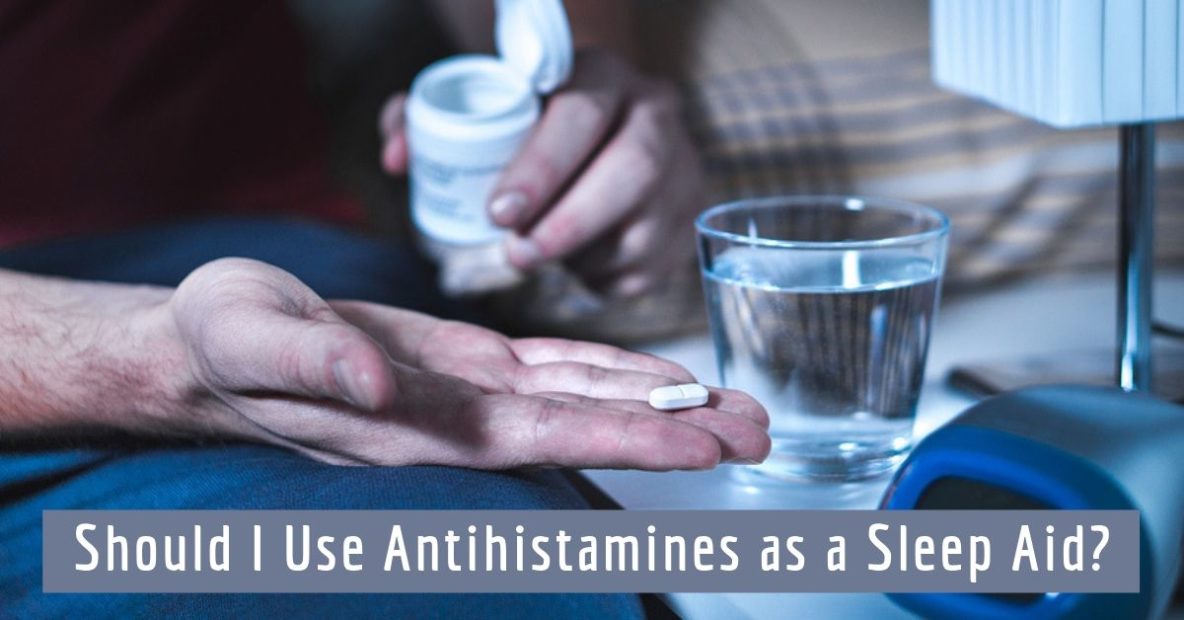Should I Use Antihistamines as a Sleep Aid?

- A Promising Paradigm Shift: New Research Challenges the CPAP-First Approach to OSA Treatment - September 5, 2023
- Understanding Sleep Meditation Techniques - July 30, 2021
- How Online Learning Has Affected Sleep for Students - July 13, 2021
Do you struggle to get enough sleep at night? Many adults complain that they aren’t getting the rest they need. Whether you have a busy schedule and too few hours in bed, or you have difficulty falling asleep and wake up repeatedly in the night, it can be hard to sleep enough. If you’ve been trying sleep aids to help you get to sleep, stay away from antihistamines.
The Importance of Sleep
Many adults in the US report sleeping less than 7 hours per night. Between work, children, a social life, and personal projects or hobbies, sleep isn’t prioritized. In fact, you might be so accustomed to feeling tired all the time that you’ve stopped seeing your sleep habits as a problem.
Adults need between 7 to 9 hours of sleep per night to feel well rested and be able to wake up each morning ready to tackle the day. Consistently sleeping fewer than 7 hours will lead to a host of problems, from difficulty concentrating to forgetfulness and daytime drowsiness. You’ll experience moodiness and irritability, and be at a higher risk for depression. Poor sleep affects your productivity, and you’ll struggle to accomplish tasks, or take far longer to solve a problem.
Using Antihistamines as a Sleep Aid
Not sleeping well is causing you a lot of stress, and you’re searching for a sleep aid to help you fall asleep easily, and stay asleep throughout the night. When you’ve taken antihistamines to relieve the symptoms of an allergy or nasal congestion, you’ve felt drowsy and fell asleep easily. However, antihistamines are only meant to be taken for a few days, and not taken on a regular basis.
While antihistamines will give you a couple great nights of deep sleep, you’ll soon build up a tolerance to the antihistamines, and they won’t have an effect on your insomnia. The longer you take them, the less effect they’ll have, and rather than experiencing deep sleep, you’ll struggle with some of the side effects such as daytime drowsiness or dry mouth.
If you’re an older adult, the list of possible side effects is much longer, and prolonged usage of antihistamines is strongly discouraged. Diphenhydramine and doxylamine, the antihistamines most commonly found in over-the-counter sleep aids, have been linked to an increased risk of dementia, and the list of side-effects include confusion, blurred vision, nausea, hallucinations, and a rapid heat rate.
Healthy Sleep Habits
Before trying over-the-counter sleep aids to help you get to sleep, take the time to develop healthy sleep habits. The most important habit is to follow a sleep routine, and go to bed and get up at the same time every day. The routine will help your body prepare for sleep in the evenings and fall asleep easily. After a few weeks, you’ll start to wake up before your alarm feeling refreshed and ready for the day.
Make sure you have some physical activity as part of your daily routine, even if it’s a walk around the block or some light stretching. This will help you get to sleep easily. Avoid drinking caffeine in the evening, and don’t have a heavy meal right before going to bed. You might be tempted to sneak in an afternoon nap, and if you’re very tired a 30-minute nap can help you recharge. However, avoid taking long naps during the day, since this will make it harder for you to follow your sleep routine, and get a good night’s sleep.
It’s common to wind down in the evening with a movie, or spending time on your smartphone. If you use technology in the evening, be sure to install a red filter on your devices, since the blue light emanating from your screen tricks your brain into thinking it’s daytime, and your body won’t be ready to sleep when it’s bedtime.
Sound Sleep Medical
Have you been struggling to fall asleep? Do you have great sleep habits, but can’t seem to get a good night’s sleep? Come see us at Sound Sleep Medical, where we’ll help you find out what’s keeping you awake. We’ll help you develop great sleep habits, and suggest ways to make your bedroom the best sleeping environment. We will also analyze your sleep to discover if you’re suffering from a sleep disorder such as sleep apnea that could be keeping you up at night.
